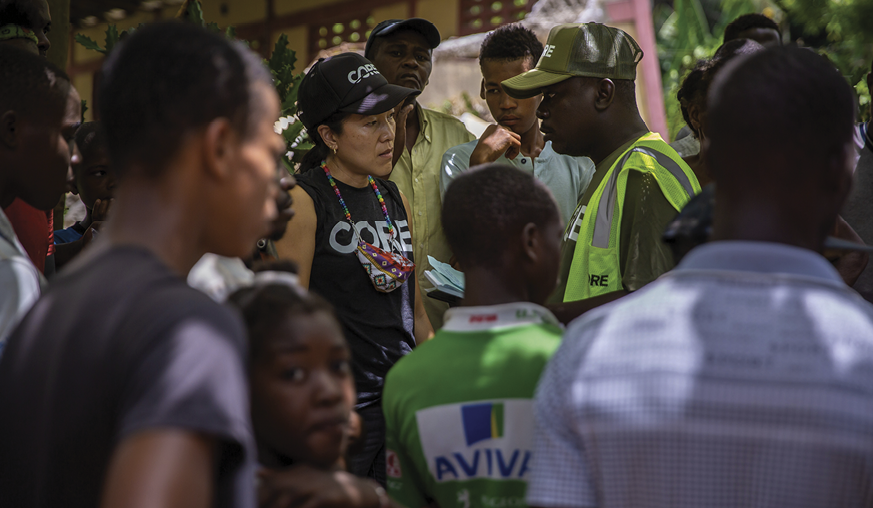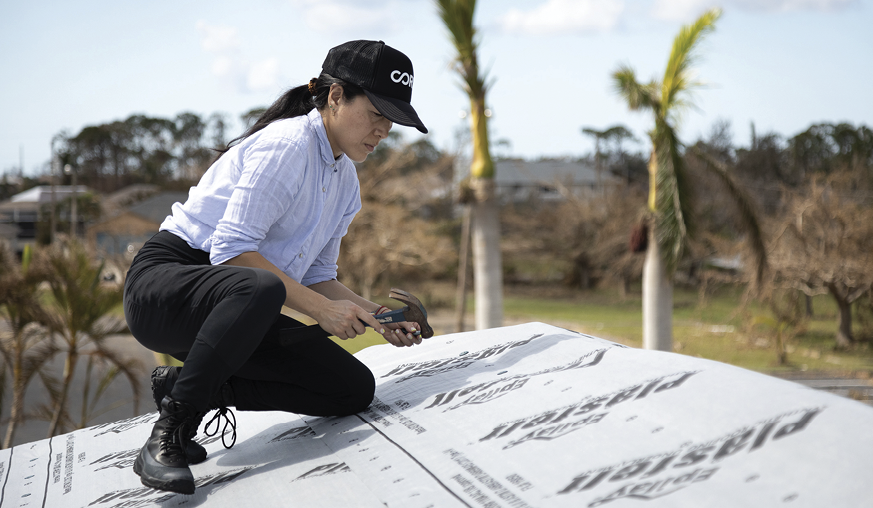- Home
- Media Kit
- MediaJet
- Current Issue
- Past Issues
- Ad Specs-Submission
- Reprints (PDF)
- Photo Specifications (PDF)
- Contact Us
- PRIVACY POLICY
- TERMS OF USE
![]()
ONLINE
![]()
ONLINE

A Community-First Response
Editors’ Note
Ann Lee has over 20 years of experience managing large scale humanitarian response and sustainable development programming across a variety of sectors including emergency relief, community upgrading and infrastructure, livelihoods and economic growth, sustainability, and local governance. Prior to joining CORE, she worked at the UN’s Organization for Coordination and Humanitarian Affairs (OCHA), serving as the lead on urban humanitarian response and as the private sector liaison for the Secretary General’s World Humanitarian Summit. Previously, she served as Country Director for CHF, where she was responsible for a $150-million portfolio of projects including emergency shelter, neighborhood planning, construction, debris removal and livelihoods. Lee has spearheaded CORE’s efforts in global areas impacted by detrimental humanitarian crises and natural disasters, including implementing a community-based response in Poland and Romania to provide resources and financial aid to Ukrainian refugees; leading the charge on the front lines of the COVID-19 pandemic in the U.S., Haiti, Brazil, and India; and shepherding a team of thousands through reconstruction efforts in Haiti after both earthquakes and devastating hurricanes in the Caribbean. Lee is the author of Livelihoods in Emergencies: A Double-Edged Sword. She developed a gender-sensitive emergency assessment tool, called the CLARA, while with the Women’s Refugee Commission, which is used by international organizations around the world. She has presented on crisis response and recovery at leading conferences and high-level meetings, such as the Concordia Summit, the Clinton Global Initiative, and the Harvard Humanitarian Summit. Lee holds a master’s in urban planning from New York University, and a master’s in economics and conflict management from Johns Hopkins University School of Advanced International Studies (SAIS). She received the Society for International Development’s prestigious Truman Award in May 2009.
Organization Brief
Founded by Sean Penn and Ann Lee, CORE (Community Organized Relief Effort) is a global crisis response organization that brings immediate aid and long-term recovery solutions to underserved communities. When a crisis strikes, CORE (coreresponse.org) responds immediately to fill gaps, mobilize resources, and establish trust and collaboration from within communities. CORE has played a pivotal role in providing critical relief to marginalized and vulnerable populations since the beginning of the COVID-19 pandemic and the humanitarian crisis in Ukraine as it continues its mission of empowering communities in and beyond crisis around the world.

Ann Lee talks with local residents and a CORE
engineering staff member during an assessment trip
through rural parts of Haiti’s Sud Department
following the 2021 Haiti earthquake
What was your vision for founding CORE and how do you define CORE’s mission?
The humanitarian sector was not designed to tackle the modern complex crisis. Today, we have overlapping emergencies and climate disasters at scales previously unseen in highly insecure environments with layered risks and vulnerabilities. Sean Penn and I established CORE to carve out a divergent path in frontline relief efforts and community impact – one that would respond swiftly to disasters and quickly adapt to the most vulnerable communities’ needs as they evolve, centered around communities. Our efforts are driven by local leaders, governments, and stakeholders, to bring equitable relief directly to those who need it most.
Will you highlight CORE’s holistic approach to its work?
It’s important to not lose sight of the fact that a healthy, safe, and thriving community requires more than immediate assistance, or just water, or just shelter. We need all of those things, plus livelihoods, education, and medical access for vulnerable families. CORE doesn’t do it all, but we do our very best to have a holistic approach for communities and to partner with other awesome groups that can provide the pieces we cannot. It’s our role as external groups to organize ourselves and be responsive to what and how people want assistance.
Will you discuss CORE’s recent efforts in impacted areas such as Ukraine, Haiti and Turkey, and how this work is progressing?
CORE has been active in Haiti since 2010 when Sean founded the organization as J/P HRO. From managing the largest refugee camp in Haiti to establishing a school, implementing women’s entrepreneurial programs, and building a state-of-the-art university science wing, CORE has been deeply invested in a long-term approach. Over the past 13 years, we have worked to support Haitians and break the cycle of poverty and violence. Even as the insecurity continues at an alarming rate, CORE has continued to maintain a children’s elementary and middle school, including a music program, which offers a safe haven where kids can safely learn and play. Providing kids with education, hot meals, music, and other programs is essential. We are also in the south of Haiti providing food security through a number of programs, while continuing our commitment to climate impacts through our biodiversity program, focusing on soil stabilization, replanting, and agroforestry.
During the COVID-19 pandemic, we expanded broadly into international relief efforts and this primed us to activate quickly in response to the war in Ukraine. Since our efforts began at the start of the war, CORE has holistically supported displaced Ukrainian refugees, many of them women and children. We have launched a cash assistance program, provided access to women’s health resources, and worked in tandem with community leaders and local governments to rebuild homes and schools, and provide mental wellness and protection services for refugees. Our teams in Poland and Romania are actively working to support displaced refugees including supporting families to integrate into their new environments. We are also providing support to the front lines with emergency materials, and most recently in response to the bombed dam in the Kherson region of Ukraine. We are now focused on a two-pronged approach, providing emergency assistance to recently liberated areas as well as the reconstruction and rehabbing of homes and schools with funding from our partner Sae-A. We are so proud to be working with long-time partners who understand the importance of reconstruction and longer-term investments for recovery.
Earlier this year, we activated another international response in Turkey following the devastating earthquakes. This is an incredibly complex context to activate a response due to the geopolitical challenges of the region. To navigate this, we are funding local groups to provide food and hygiene kits, as well as helping businesses get back up and running again.

Ann Lee tarps a roof near Fort Myers, Florida during
the initial phase of CORE’s response to Hurricane Ian in 2022
How is CORE addressing climate change and what are the keys to creating sustainable impact in this effort?
CORE attended the 2015 United Nations Climate Change Conference where we signed a landmark agreement with the French government and other partners to make a commitment to climate adaptation investments in Haiti. Since signing that agreement, CORE was the only organization that continued its commitment to Haiti and climate adaptation investments. From watershed management to agroforestry, biodiversity, and soil management and retention, we have several active climate resiliency programs in Haiti. Additionally, we have implemented preparedness initiatives in disaster prone areas, such as in North Carolina where hurricanes have wreaked havoc and Northern California in wildfire prone areas that have high Social Vulnerability Indexes. For wildfire prevention, we are “hardening” homes and clearing out fire prone brush with and through the county, local leaders, and residents.
How critical is it for CORE to build strong partnerships with government leaders and the business community to be successful in its efforts?
The three essential nodes in any response are community, private sector, and government. These are the legs to the stools that are needed for sustainable recovery. Working closely with these sectors also prevents the unintended consequences of undermining existing systems, and impeding the recovery process, which we have seen in so many failed responses. Each entity has its own strengths, resources, and connections that will help ensure an initiative is successful and sustainable in the long term. When you undermine these systems, you can do more harm than good.
Will you discuss the strength and talent of CORE’s team?
We have heart. We have incredible folks who eat, breathe, and sleep this mission and are driven by an innate sense of responsibility to do something to improve our collective world. I am constantly moved to tears and awed when listening to the work, thoughtful approaches, and heart behind our teams. From the community, for their community, we are learning from them every day. They are the lifeblood of everything we do.
Were you always attracted to nonprofit work and what has made this work so special for you?
I think, to do this work, you need to be extremely tenacious and super optimistic. I always had a fighter’s spirit in me – any injustices I felt growing up as an outsider elicited a very powerful reaction. I was always standing up for others as a kid when I felt that someone was being picked on or treated unfairly. Often it was from watching my parents, not speaking English very well and encountering mockery, that drove me to jump in. As an adult, I’ve channeled that fighting spirit into focusing on the injustices we see every day in the world.
The most inspirational experience I have had with CORE was in 2018, following a massive hurricane that hit Haiti, destroying thousands of homes and commerce in major cities. Our entire Haitian team responded, setting up debris removal and roof repair, providing immediate shelter and medical care, and participating in the coordination meetings with local mayors and government leads. The government representatives expressed their gratitude to see a Haitian-led team responding to the communities’ needs, which not only boosted the morale of our seasoned responders in Haiti, but it also made me feel so honored to work alongside our amazing Haitian colleagues.
Do you feel that your Korean heritage has impacted your work?
My ideology and never-ending drive can be attributed to the line of strong Korean women I was raised by. My mother and both grandmothers were extremely strong and dedicated to helping others. My maternal grandmother was an activist in Korea, and once she moved to America, she organized her community of elderly friends to learn how to swim, speak English, and navigate public transportation. They did all of this while persevering against racist and xenophobic experiences. They truly inspire me to be a force for good in the humanitarian space. The Korean community in Los Angeles is tight knit and supportive, and I’ve seen firsthand how a close community can thrive by helping each other and building sustainable systems, which is a model for how CORE always enacts a community-first response.
What are your priorities for CORE as you look to the future?
Our biggest priority is to optimize our responses to be more demand driven by communities, and to invest and grow local leadership in these responses. We feel that coordination and improved approaches are lacking, and we hope to be part of the learning process to improve our sector. We are also eager to continue addressing crises holistically, integrating the needs of vulnerable populations while also being mindful of how issues like climate change will increase the severity of future crises. But we need the support of humanitarian partners as well as the public in order to achieve our mission. The best way to help is to follow CORE on our website, COREresponse.org, and social media channels like Instagram, Twitter/X, and Facebook to stay updated on our programs and global crisis response.![]()